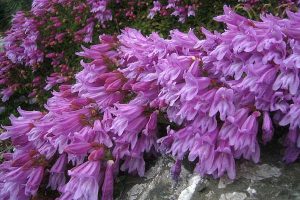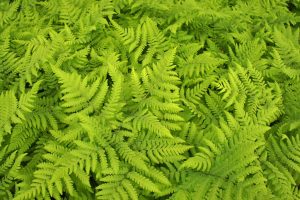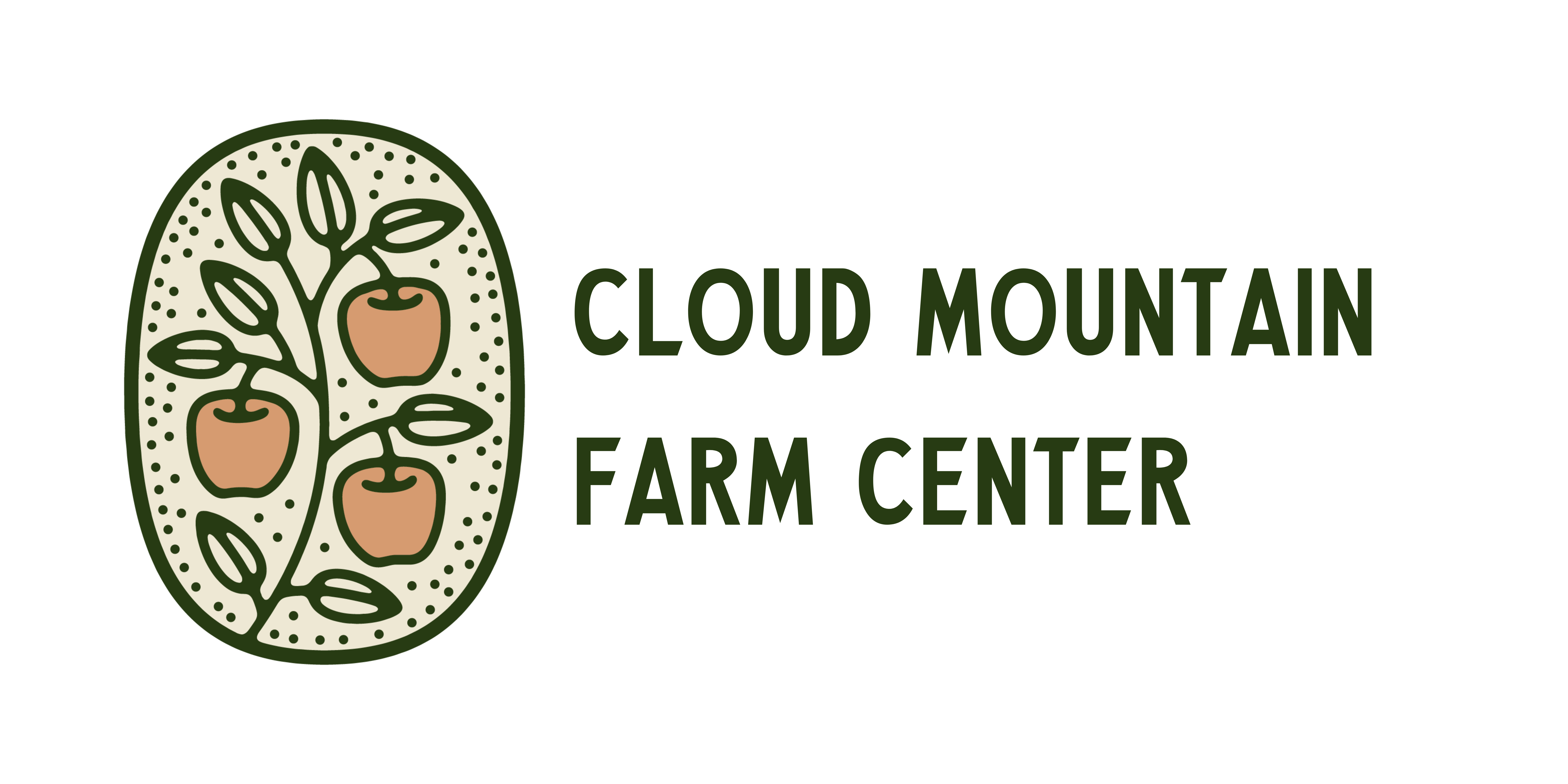Download a pdf of Gardening with PNW Native Plants

Penstemon davidsonii
The Pacific Northwest is blessed with an incredible array of native plants which are great ornamentals for the garden. Because these plants have evolved in our wet-winter, dry summer climate, they are able to thrive in gardens that may be challenging for introduced or exotic species. It is still important to know the right environment for each native plant you plan to use in your garden; each native species has its preferred environmental niche. If you have soil that is very sandy and lean, choose drought tolerant species that prefer well drained soils and can tolerate drought. If your soil is heavy and tends to stay wet well into summer, choose plants that tolerate wet soil.
We’ve put together an abbreviated list of Pacific Northwest Natives with some very general information about what type of soils and sun exposures they prefer. Click on the links for more information about habitat and range.
| Plant | Light Exposure | Soil Type Preferred | Size at 10-15 Years | Comments |
| Trees | ||||
| Acer circinatum- Vine Maple | Sun to shade | Rich, well drained | 15′-20′ | Drops leaves early if too dry |
| Arbutus menziesii- Pacific Madrone | Sun to partial shade | Lean, Well drained | 20′-30′ | Difficult to establish |
| Betula papyrifera- Paper Birch | Sun | Average to Wet | 30′ | Fairly tolerant of wet soil |
| Chamaecyparis(Callitropis) nootkatensis- Alaskan Cedar | Sun-partial shade | Average to moist | 15′ | Narrow form |
| Cornus nuttallii- Pacific Dogwood | Partial shade | Moist, well drained | 20′-30′ | Subject to canker |
| Corylus cornuta- Beaked Hazel | Sun to partial shade | Rich, well drained | 10′ | Small edible nuts |
| Picea sitchensis- Sitka Spruce | Sun | Average to Wet | 12′-15′ | Fairly tolerant of wet soil |
| Pinus contorta contorta- Shore Pine | Sun | Average to Wet | 10′-12′ | Tolerates both drought and wet soil |
| Prunus emarginata- Bitter Cherry | Sun to partial shade | Average to Wet | 10′-12′ | Good wildlife tree as birds like the fruit |
| Quercus garryana- Oregon White Oak | Sun | Lean, Well drained | 15′-20′ | Drought tolerant when established |
| Pseudotsuga menziesii- Douglas Fir | Sun | Rich, well drained | 12′-15′ | Needs deep soil to tolerate wind |
| Rhamnus (Frangula) purshiana- Cascara | Partial to full shade | Dry to wet | 10′ | Fairly tolerant of wet soil |
| Taxus brevifolia- Pacific Yew | Partial to full shade | Rich, well drained | 8′-10′ | Drought tolerant when established |
| Thuja plicata -Western Red Cedar | Sun to partial shade | Average | 12′-15′ | Excellent hedging tree |
| Tsuga heterophylla- Western Hemlock | Sun to shade | Rich, well drained | 10′-15′ | Grows large |
| Tsuga mertensiana – Mountain Hemlock | Sun to partial shade | Rich, well drained | 6′-8′ | Best conifer for small yards |
| Shrubs | ||||
| Amelanchier alnifolia-Serviceberry | Sun to partial shade | Average to wet | 10′-12′ | Good wildlife tree as birds like the fruit |
| Arctostaphylos columbiana- Hairy Manzanita | Sun to partial shade | Lean, well drained | 4′-8′ | Drought tolerant when established |
| Arctostaphylos uva-ursi- Kinnikinnik | Sun to partial shade | Lean, well drained | 6″-12″ high, 3′-4′ wide | Drought tolerant when established |
| Cornus sericea- Redtwig Dogwood | Sun to partial shade | Average to wet | 6′-8′ | Very tolerant of wet soil |
| Garrya elliptica-Coast Silktassel (Oregon native) | Sun to partial shade | Rich, well drained | 6′-8′ | Drought tolerant |
| Gaultheria shallon- Salal | Sun to shade | Average to wet | 3′ high, Spreads | Prefers moist |
| Holodiscus discolor- Ocean Spray | Sun | Lean, well drained | 8′-10′ | Drought tolerant when established |
| Kalmia microphylla- Mountain Laurel | Sun to partial shade | Average to wet | 4′-6′ | Fairly tolerant of wet soil, not drought tolerant |
| Mahonia aquifolium- Tall Oregon Grape | Sun to shade | Dry to wet | 6′-8′ | Tolerates many soil types |
| Mahonia nervosa- Low Oregon Grape | Partial shade to shade | Rich, well drained | 2′-3′ high, Spreads | Prefers rich soil |
| Morella (Myrica californica)-Pacific Wax Myrtle | Sun to partial shade | Lean, well drained | 10′-15′ | Drought tolerant when established |
| Myrica gale-Sweet Gale | Sun to partial shade | Average to wet | 5′-6′ | Very tolerant of wet soil |
| Pachistima myrsinites – Oregon Box | Sun to shade | Lean, well drained | 2′-3′ | Drought tolerant when established |
| Philadelphus lewisii- Mock Orange | Sun to partial shade | Lean, well drained | 6′-8′ | Drought tolerant when established |
| Physocarpus capitatus- Western NineBark | Sun to partial shade | Average to wet | 8′-12′ | Very tolerant of wet soil |
| Rhododendron macrophyllum- Pacific Rhododendron | Partial shade to shade | Lean, well drained | 5′-6′ | Drought tolerant when established |
| Ribes sanguineum- Red Flowering Currant | Sun to partial shade | Lean, well drained | 6′-8′ | Drought tolerant when established. Good wildlife shrub, flowers for hummingbirds, and berries for songbirds. |
| Vaccinium ovatum- Evergreen Huckleberry | Sun to shade | Rich, well drained | 6′-8′ | Sweet, edible berries late summer |
| Vaccinium parviflorum- Red Huckleberry | Partial shade to shade | Rich, well drained | 6′-8′ | Needs organic rich soil to thrive |
| Native Perennials | ||||
| Adiantum pedatum (aleuticum)– Maidenhair Fern | Partial shade to shade | Average to wet | 2′ | Needs moist summer soil |
| Blechnum spicant– Deer Fern | Partial shade to shade | Rich, well drained | 2′ | Drought tolerant when established |
| Polystichum minutum– Sword Fern | Sun to shade | Dry to wet | 2′-3′ | Drought tolerant when established |
| Aquilegia formosa – Western Columbine | Sun to partial shade | Rich, well drained | 1′-2′ | Loved by hummingbirds |
| Asarum canadensis– Wild Ginger | Partial shade to shade | Rich, well drained | 6″ high, spreads | Drought tolerant when established |
| Camassia leitchlini– Great Camas | Sun to partial shade | Spring wet, summer dry | 2′ | Summer dormant |
| Camassia quamash– Lesser Camas | Sun to partial shade | Spring wet, summer dry | 1′ | Summer dormant |
| Cornus canadensis (unalaschkensis)- Bunchberry | Partial shade | Rich soil, some moisture | 6″ high, spreads | Some drought tolerance |
| Dryas octapetala– Mountain Avens | Sun | Lean, well drained | 6″ high, Spreads | Drought tolerant when established |
| Erythronium oregonum – Fawn Lily | Sun to partial shade | Rich, well drained | 6″-8″ | Summer dormant |
| Fritillaria lanceolata – Chocolate Lily | Sun to partial shade | Spring wet, summer dry | 8″ | Summer dormant |
| Gymnocarpium dryopteris – Oak Fern | Partial shade to shade | Average to wet | 6” high, Spreads | Will go dormant early in dry summers |
| Iris douglasii- Pacific Coast Iris Oregon native | Sun to partial shade | Spring wet, summer dry | 8″ | Drought tolerant when established |
| Iris inominata- Golden Iris Oregon native | Sun to partial shade | Spring wet, summer dry | 6″-8″ | Drought tolerant when established |
| Lewisia columbiana – Columbia Lewisia | Sun | Lean, well drained | 6″ | Drought tolerant when established |
| Lilium columbiana – Western Tiger Lily | Sun to partial shade | Rich, well drained | 8″-12″ | May go dormant early if dry |
| Penstemon davidsonii– Davids Penstemon | Sun | Lean, well drained | 4″-6″, Spreads | Drought tolerant when established |
| Smilacena (Maianthemum) stellata– Star flowered Solomon Seal | Sun to partial shade | Rich, well drained | 8″, Spreads | Will run in rich soil |
| Smilacena (Maianthemum) racemosum– Large false Solomon Seal | Sun to partial shade | Rich, well drained | 2′-3′ | Attractive berries for the birds |
| Trillium ovatum– Pacific Trillium | Partial shade | Rich, well drained | 8″-12″ | May go dormant early if dry |
| Vancouveria hexandra- Inside OutFlower | Partial shade | Rich, well drained | 10″-12″, spreads | Some drought tolerance when established |
 Gymnocarpus dryopteris, Oak Fern
|
Resources:
Pacific Northwest Wildflowers Books: Gardening with Native Plants Arthur Kruckeberg |
|||
